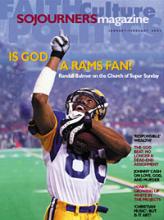For much of the 30 years that I have been in some of America's top newsrooms, religion was treated like those klutzy galoshes our parents forced on us during heavy snowstorms. We knew we were supposed to leave them outside the door. Bodies were welcome, minds were fertile territory, but matters of the soul—the deep stuff of faith that determines what people will live for, die for, and go to war for—were off-limits. The most dead-end beat in the newsroom was religion. Too often it meant Saturday church-reporting—little more than "feel-good" items to wrap ads around. People complained that journalists and editors were squeezing out the essence of their experiences by editing out their religion, or by refusing to report faith's role.
One of the most arrogant displays of religious censorship I saw was in 1990, shortly after the breakup of the Soviet Union and the collapse of the Eastern bloc. Czech president Vaclav Havel gave a speech where he advanced the idea that a God-centered spiritual revolution was a huge contributor to the fall of communism. I read the speech as it came over the Associated Press wire, eager to see such a disparate view finally showing up in the press. Most of the public, however, never had the chance to savor the remarks because much of the media, including The New York Times, edited out all references to the impact of spirituality.
How far we have come. I now worry more about faith being trivialized and God being reduced to an irrelevant sound bite than about religion being forced to hover outside newsroom doors. Some editors now understand that the wall of separation between church and state should be more gossamer than concrete. And still others now understand that soul and spirit are so instrumental to the human condition that to deny their reality ensures that truth will be held hostage.
Read the Full Article
